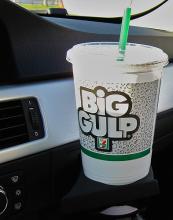Culture
Andy Samberg's PSA on cannibalism -- behind the scenes look at The Hobbit -- The Atlantic's Puppy Cam and scientific survey -- and Japan's Wan Wan Dog Circus. See these and more in today's Links of Awesomeness...
If you grew up watching Mister Rogers’ Neighborhood, then this video may give your day a little extra cheer. In this new remix, engineered by Symphony of Science’s John Boswell for PBS Digital Studios, the many wonderful sayings and happenings of one Fred Rogers are mashed together in a tune they’re calling, “The Garden of Your Mind.” Take a listen to the remix song below. [via USA Today]

Among my must reads are the Sunday New York Times Book Review and other book reviews I come across in various media outlets. There are too many books being published that I would love to read, but just don’t have the time. So, I rely on reading book reviews as one way of keeping in touch with what’s being written.
Here are my picks in this week’s books of interest.
New world records in holding breath and paper lantern launching -- Michelle Obama on growing Barack-oli -- Andy Samberg's new television venture -- Edward Sharpe and the Magnetic Zeros. See these in today's Links of Awesomeness...
 There is a dangerous marketing strategy when it comes to food and our children. No, it’s not “sugar” or “fat” or even promotions of “low sugar” or “low fat."
There is a dangerous marketing strategy when it comes to food and our children. No, it’s not “sugar” or “fat” or even promotions of “low sugar” or “low fat."
Most of the food-marketing ploys aimed at kids are contributing to the soaring rate of obesity.
Here’s why, and here’s why it is so personal to me.
I’ve told my story many times of how I struggled with being overweight as a child and teen. The problem wasn’t “baby fa," it was the freedom I had to eat O’Henry bars and ice cream on a daily basis at my grandparents' house. How fun!! Weekly visits to Bullwinkles (does anyone else remember that place?) and McDonald’s made eating exciting!
Back in the 1970’s and '80’s, marketing food to children as entertainment was only making its debut. Now, it’s a multi-billion dollar industry that’s derailing healthy lifestyle patterns for our kids right before our eyes. And we’re OK with that?
In this clever mashup, the POTUS gives a new take on Carly Rae Jespen's radio hit "Call Me Maybe." While it may not be as endearing as his rendition of Al Green's "Let's Stay Together," it still gives us something to smile at until the next musical tribute.
My eyes locked with those of the priest just as his right hand, gripping the aspergillum, went back (in a wind-up that would impress many baseball enthusiasts) and then forward, sending a shower of water across my face and torso.
While I wiped water from the bridge of my nose, we both laughed and I could see the jolly Irish priest’s arm go back once again as he prepared to douse the people seated in the pew behind mine.
So began the annual Blessing of the Artists in Laguna Beach, the sleepy seaside village where I live in southern California. Blessing the artists is a community tradition that goes back almost 15 years, begun at the behest of the artists themselves. The ritual is held the first week in June, in advance of the opening of the Sawdust Festival and the Festival of the Arts, art exhibitions held here each summer and populated largely by artists and artisans from the town itself.
An award winning new short starring Kevin Spacey -- the most extroverted city in the U.S. -- Wilco releases free e-book -- The Daily Show's coverage of the Queen's Diamond Jubilee -- Jason Schwartzman and Jimmy Fallon's ode to a pepper. See these and more in today's Links of Awesomeness...
Novelists set down the typewriter and pick up the paintbrush -- cross stitching electrical circuts -- beautiful photos of colored ink underwater -- Improv Everywhere strikes again with a car alarm stunt -- Pulitzer-prize winning author Dave Eggers talks new novel. See these and more in Today's Links of Awesomeness...

It seems that America is on the verge of a zombie apocalypse.
First, Ronald Poppo had most of his face eaten off by Rudy Eugene, and now, Alexander Kinyua reportedly killed his roommate, Kujoe Bonsafo Agyei-Kodie and then ate his heart and part of his brain.
Is it just coincidence that this spate of violent attacks comes when the county’s fascination with zombies is at its height, or is there a connection?
From movies to video games, Zombies are the big ticket these days. The undead top the media charts, gnawing and clawing their way into the forefront of our imaginations. Move over vampires; Zombies are the new black.
It’s hard to say if the pop culture popularity has influenced similar copycat killers, or if the zombie craze simply has made us more sensitive to similar real-life stories. Either way, both the fictional tales and actual news items may speak to something going on in our collective imaginations.
Sweet 16 and never been theologically on point.
Got some good ones this week. Enjoy.

A batch of the best new audio and visual stimulation. Roman Mars' podcast explores the craft of Trappist beer — nature-loving artist trades the electronic equipment for some earthy sounds — Andrew Bird's hit "Eyeoneye" gets the stop-motion video treatment -- the iconic walls of Sydney's Opera House are the backdrop for a new artful video projection — a Super Mario Brothers themed aquarium — summer rock vibes, and more. See today's Links of Awesomeness...

If New York City Mayor Michael Bloomberg gets his way, Big Gulps and any other super-sized sugary soft-drinks will go the way of smoking at the Oyster Bar and Times Square peep shows and trans-fat-deep-fried corndogs.
Earlier this week, Bloomberg proposed a citywide ban on any serving of sugary-sweet soda more than 16 ounces in restaurants, movie theaters and street carts throughout the Big Apple.
In a column posted Friday on CNN.com, Edward Morrissey, a senior editor and correspondent for the conservative commentary website hotair.com said Bloomberg overreached (again) when he "hit the panic button" over super-sized soft drinks.
Jon Stewart did not take Bloomberg's menacing of to his (apparently) beloved Big Gulp lying down. "Mister Mayor, this ban makes your assinine look big," Stewart said on Thursday's The Daily Show. "And what do you do about Slurpees?! A drink that lives in the netherworld betwixt physical states. Is it a solid? A liquid? Ultimately a gas?"
IN THE GREAT gospel and blues tradition of affirming in the negative, Bruce Springsteen’s new album, Wrecking Ball, is simultaneously a ferocious roar of righteous anger at what the captains of Wall Street did to America in 2008 and a riotous celebration of American roots. That could make it the perfect soundtrack for a spring and summer resurgence of the Occupy Wall Street campaign.
At this point a new album from Bruce Springsteen is no longer an earth-shaking event, even in the world of rock and roll. After all, the guy is 62. In the past few years, two core members of his band (organist Danny Federici and sax man Clarence Clemons) have died, not from rock-star excesses but from the old-guy ailments of skin cancer and stroke, respectively. And The Boss’ last album of new material, the 2009 Working on a Dream, was definitely subpar.
But with Wrecking Ball, Spring-steen has, for the second time within a decade, stepped forward to assume the role of a Telecaster-toting poet laureate and produced a stirring work of popular art that speaks to the depths of the national condition. The first time was with The Rising, his 2002 meditation on mortality and loss in response to 9/11. The songs in this new collection plainly declare about our ongoing economic crisis what no mainstream national political leader has been willing to say: We were robbed, and the thieves have escaped justice.
DISNEY ANIMATION is often criticized for masking cynical corporate values—Wall-E’s profound challenge to over-consumption was accompanied by the selling of toys and games; the company claims to be pro-feminist but only tweaks the fairytale princess archetype with heroines who express their “strength” by showing that they can fight like a man.
Yet there’s still some magic in the Disneymagination—Fantasia, The Jungle Book, and The Lion King, despite their political alarm bells (racism and homophobia are challenged and reinforced, the average of which can only compute to ambivalence), are examples of visual resplendence, a sense of humor, and an invitation to hope. The best parts of the Disney worldview look like the eschatological images in a Martin Luther King Jr. speech; the worst merely bolster a culture of privilege and exclusion.
The most Disney-like current film is Mirror, Mirror, a retelling of the Snow White story, directed by the fantastic visual stylist Tarsem Singh. It features Julia Roberts in a wickedly entertaining turn as the queen, with a witty script, gorgeous set and costume design, and some bawdy fun. But the portrayal of Snow White as a “liberated” young woman whose liberation depends on her behaving like a Bruce Willis action character produces a paradox: Any of the images from this film could be exhibited in an art gallery—so elegantly composed and imaginative are they—but the ethical heart of the film isn’t artful at all.
Street Stories
UCLA professor Jorja Leap has immersed herself in the study of Los Angeles gangs since 2002. Jumped In: What Gangs Taught Me about Violence, Drugs, Love, and Redemption displays her deep passion and anthropological insight. Beacon Press
Up with (Real) People
Corporations Are Not People: Why They Have More Rights Than You Do and What You Can Do About It, by Jeffrey D. Clements, looks at the roots and consequences of the Citizens United vs. Federal Election Commission case and presents a strategy to fight back. Berrett-Koehler
THE VIDEO for the title track of 2/3 Goat’s EP Stream of Conscience features members of the New York City-based band standing knee-deep in a stream in the mountains of Central Appalachia. Lead singer and mandolin player Annalyse McCoy belts: “Stream of conscience hear my cry / I don’t want my hills to die.” The video intermixes a fictional family’s daily life in the coalfields with harrowing footage of mountaintop removal (MTR) coal mining, which has destroyed more than 300 mountains in the region. In later scenes, the band walks down a country road with coal-dust covered miners, young people, and families in a rambling, spontaneous protest march. It truly is a visual evocation of Appalachia Rising—a tagline of the region’s anti-MTR movement.
The other core members are guitarist, song writer, and vocalist Ryan Dunn and fiddler Ryan Guerra. 2/3 Goat is a self-proclaimed metrobilly band, a portmanteau referring to the music’s urban audience and its roots in country and mountain music. Its acoustic-driven, bluegrass- and old-time-music-inspired sound has engaging harmonies and a sweetness and honesty to it. The other tracks on this five-song release are strong, both in musical composition and storytelling. “Lay It on the Line” is a playful duet between McCoy and Dunn with upbeat fiddle, guitar, and mandolin accompaniment that will make you want to flat foot (if you have enough mountain swagger to pull it off) to this almost-love song. “Band of Gold” highlights McCoy’s textured alto voice and ability to wail when the lyrics call for it. The tone is emotionally heavy, but the fiddle accompaniment and the shift in tempo at the end of the song save it from needing a side of whiskey to wash it down.
WITHOUT SOME advance warning, you might not know that Jeff Sharlet is a man of God. That’s not an insult or backward compliment so much as it is fact. Though perhaps best known for his acclaimed nonfiction expose The Family: The Secret Fundamentalism at the Heart of American Power, Sharlet doesn’t beat readers over the head with the proverbial Bible he carries in his knapsack. If you don’t know what clues to look for—tales of Germans born again in Oklahoma, descriptions of hipster trucker caps emblazoned with flashy youth crusade logos—you might miss some of his most powerful nods to spiritual and religious influence in his travels. You might mistake the nondenominational journalist for just another fantastically gifted storyteller, a shrewd correspondent reporting back from remote spiritual enclaves, rather than a disciple of God seeking to understand those with whom he shares some belief.
Sweet Heaven When I Die begins by tracing Sharlet’s youthful days visiting a girlfriend’s Colorado ranch and his grandmother’s Knoxville home. His keen sense of personal history first grounds his essays in what is clearly important in his own life: the closeness of loved ones, the nearness of God. But he quickly moves beyond situating himself in his writing and instead steps back to peer like a prophet into the lives of others—philosopher and educator Cornel West or Yiddish novelist Chava Rosenfarb.
Sharlet also nimbly passes through the outer realms of faith and lack thereof. In one of the book’s most poignant vignettes, he retraces the short life of Brad Will, once called one of the country’s “leading anarchists.” (The oxymoronic label suitably amused Will.) Will’s activism began in a same-sex marriage standoff with Promise Keepers in Boulder, Colorado, and then carried him north to Quebec City and south to his 2006 death in Oaxaca de Juarez. Throughout his fiery life, he kept in close contact with his straight-laced Republican family; attending his mother’s 60th birthday party celebration was a chief concern when he was detained for a week following the 1999 WTO protests in Seattle.
You can’t desire to catch the sacred fish
as much as he desires to be caught
& yet
he darts through the dim depths
with tail swerve & swish
laughs with the joy of glistening fins
at huge holes in your net
through which he swims
To get the shining coin from his mouth
is worth selling all you have
To get him even better
Everything you know about him
wavers in uneven light
EVERYONE CAN USE a fresh start from time to time. When Enco and Esso oil companies combined in 1973, they came up with the name Exxon—a word that at the time had no meaning or connotation—and then moved forward as a completely new company. Now, of course, we know that Exxon means “Lucifer’s Henchperson of the Coming Darkness.” So when Exxon and Mobil combined in 1999 to become the most powerful oil company in the world (Saudi Arabia is a small subsidiary), they wanted to distance themselves from the high negatives of the old name. So they came up with ExxonMobil, leading a confused public to ask, “Gee, I wonder what they sell?”
The point is, sometimes institutions need a makeover, and who better to turn over a new leaf than al Qaeda, an organization that, for at least the last decade, has suffered some really bad press.
As documents from his not-so-secret compound have revealed, al Qaeda leader Osama bin Laden was concerned about the deteriorating reputation of his organization. The brand had become a problem. Too many mistakes in targeting and execution had tarnished all the positives of the proud al Qaeda name, which used to be synonymous with acts of mercy, community building, and the delicious cookies they sold door to door. (Thin Mints were my favorite.)